Vauxhall has a new family face. Both the Astra family hatch and the Corsa supermini now wear the brand's distinctive 'visor' front end, helping them look sharper than ever.
If you're dead-set on a Vauxhall hatch, you have a choice between the larger and more expensive Astra, and the smaller, more affordable Corsa. Obviously, your budget will be the biggest decider but, if yours falls in the grey area between a top-spec Corsa and an entry-level Astra, which is the better buy?
We'll compare these two hatches side-by-side, so you can choose the one that best fits your needs and your wallet. Huge savings over the brand-new price are available if you buy either as a used car from Motorpoint.
Vauxhall Astra vs Vauxhall Corsa compared
| Vauxhall Astra | Vauxhall Corsa |
Pros:
| Pros:
|
Cons:
| Cons:
|
Styling and design
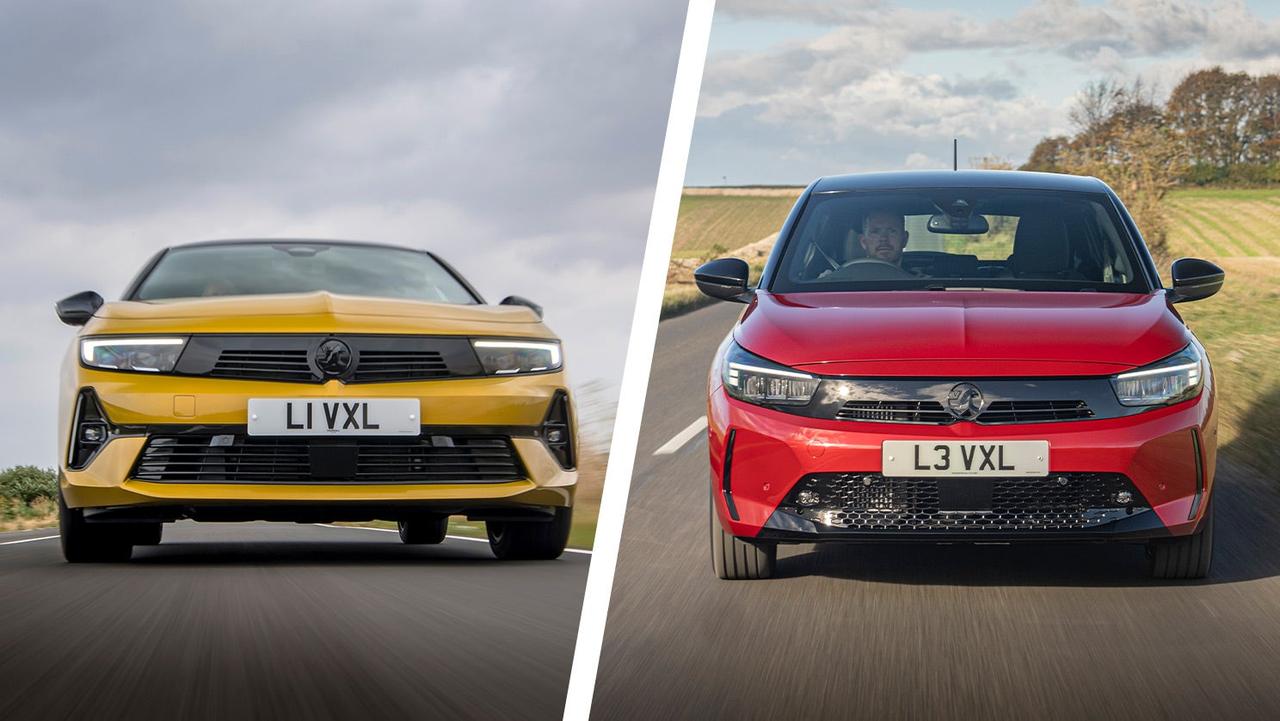
The Astra is a fresh, ground-up design that arrived relatively recently. As a result, its styling is more cohesive than the Corsa. Its most distinctive feature is the wide 'visor' motif that blends the front grille into the pointed headlights, recalling the chiselled looks of '70s Vauxhall and Opel cars. The rest of the bodywork matches the front-end look, with sharp creases and horizontal lines giving the car a sense of width and length. Entry-level Design models miss out on the larger alloys, sporty body kit and contrast-black roof of GS-trimmed cars and up, which leaves them looking a little plain in comparison.
Following a facelift, the Corsa now has the same visor-style front end as the Astra and, again, it helps give the car a distinctive signature as it drives towards you. However, gaining the visor as part of a facelift means it doesn't sit as harmoniously with the rest of the car's styling, which has more curves and dynamic lines that seem to contradict its angular face. There's nothing offensive about the way the Corsa looks – the large alloys and contrast-colour roof fitted to higher-end models even help give it a little more street cred – it's just not a car that'll earn you jealous glances as you cruise down the high street.
Interior and practicality
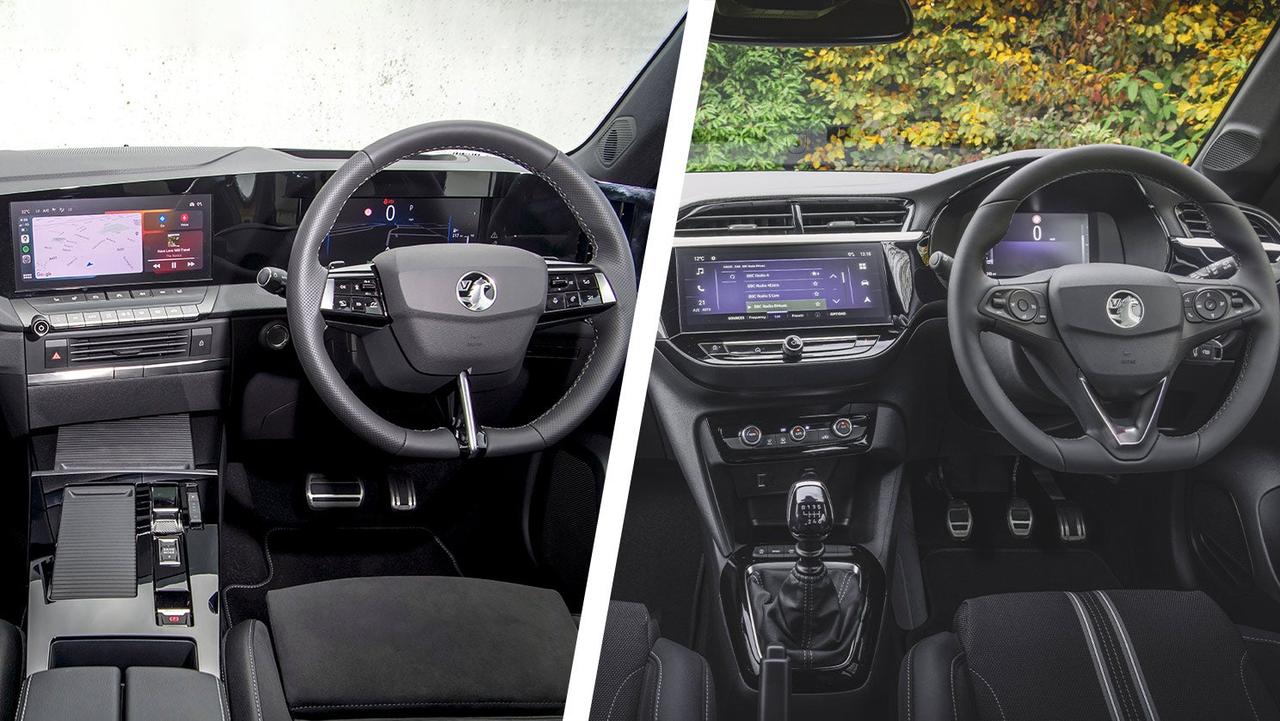
The Astra's interior feels as up-to-date as its exterior. There's a wide, sweeping panel atop the dashboard that contains both the central infotainment system and the driver's dials. Below the middle screen, there are neat piano-key-style buttons for important climate control functions, as well as a proper physical knob to adjust the stereo volume. There are intersecting lines all over the dash and door panels, featuring a selection of soft-touch and hardy cloth materials, with the odd splash of colour or metal-effect trim to lend it some visual drama. We're not sold on the huge slab of gloss-black plastic on the centre console but, broadly, the Astra's cabin impresses.
You have to temper your expectations in the Corsa because it's a more affordable car, so you can't expect the same luxurious appointments as the Astra. Instead, you'll find most of the interior styling boils down to some coloured plastic blade shapes on the dashboard, and that's about it. There is, at least, a large infotainment screen in the middle of the dash which, like the Astra, includes Apple CarPlay and Android Auto. You'll find proper physical controls for key functions but, unlike the Astra, almost all panels beyond the dashboard are exclusively made from hard, cheap-feeling plastic.
As for which car is the most practical – that's easy. The Astra is bigger than the Corsa, so has more passenger and boot space. Case closed. It's not quite that simple, however, because the Astra makes better use of the space it takes up than the Corsa. There's genuine room in the Astra to transport four tall adults in reasonable comfort – save for rear passengers having to duck to avoid bumping into the roofline – whereas the same four will have to negotiate fitting into the Corsa's cabin, and those in the back will be sat far more upright. The Astra's boot is wide, square and low and its 422-litre figure handily outclasses the Corsa's 309-litre space.
Engines and performance
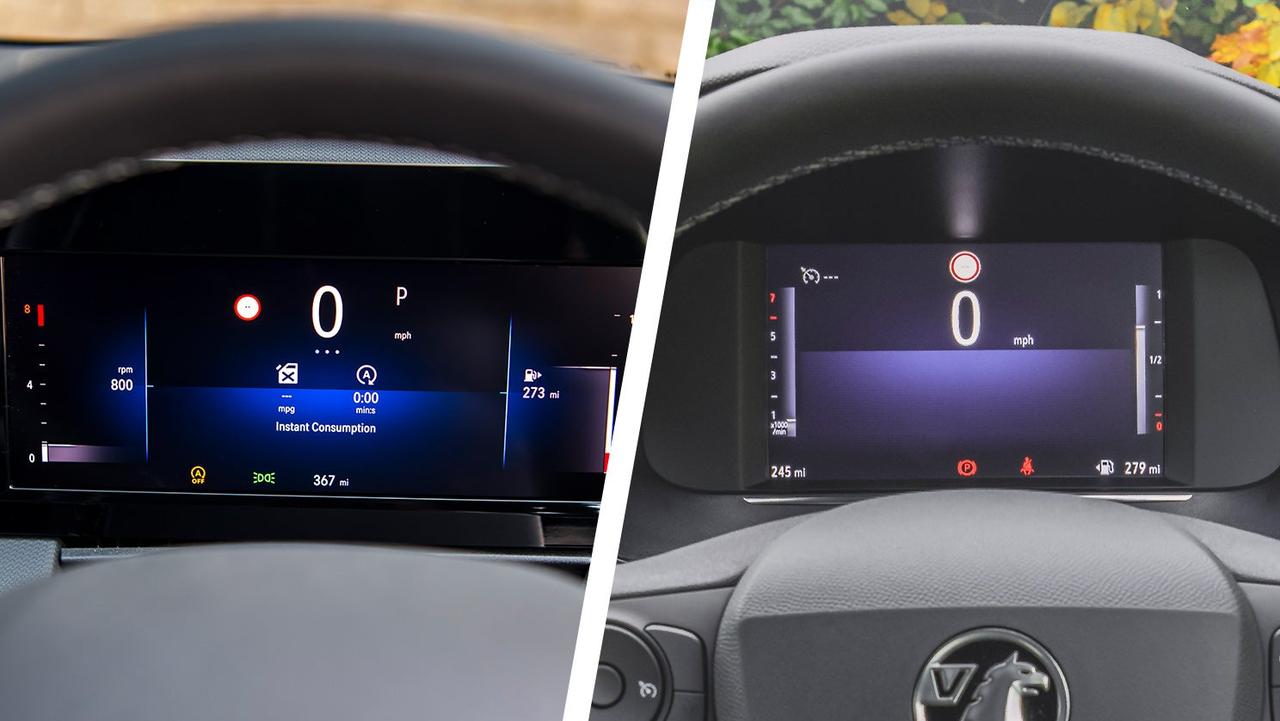
Both cars share the same 1.2-litre turbo petrol and 1.5-litre diesel engines, which are the most common options on the used market. The 1.2 turbo petrol, in particular, is a great choice in either car, with lots of grunty low-end torque to save you from constant gear changes and enough power to whisk you to motorway speeds smoothly. Just like school homework, however, you can't escape physics – the Corsa is the lighter car, so the same engines under its bonnet feel punchier than they do in the Astra, with the 130hp version almost keeping pace with junior hot hatches.
Look further up the range and the Astra gains a pair of plug-in-hybrid engines that aren't offered in the Corsa. Regular models make a total of 180hp between their 1.6-litre petrol engine and electric motor, or 225hp in the warmed-up Astra GSe. Both cut the 0-62mph dash to less than eight seconds and feel much quicker than anything in the Corsa's lineup – at a higher price point, of course. Fully charge the battery pack and you can cover a claimed 41 miles without starting the engine or, with both power sources working together, you could see three-figure average economy numbers.
If you're looking to abandon the fuel pump entirely, both the Astra and Corsa are available as fully electric cars. These are a bit expensive as brand-new models but make much more sense as a used purchase, where prices are far closer to their petrol-powered counterparts. You get zippy, near-silent acceleration from both models, plus low running costs if you can charge at home and enough range for most daily driving tasks – 258 miles in the Astra, 222 for the Corsa.
Driving
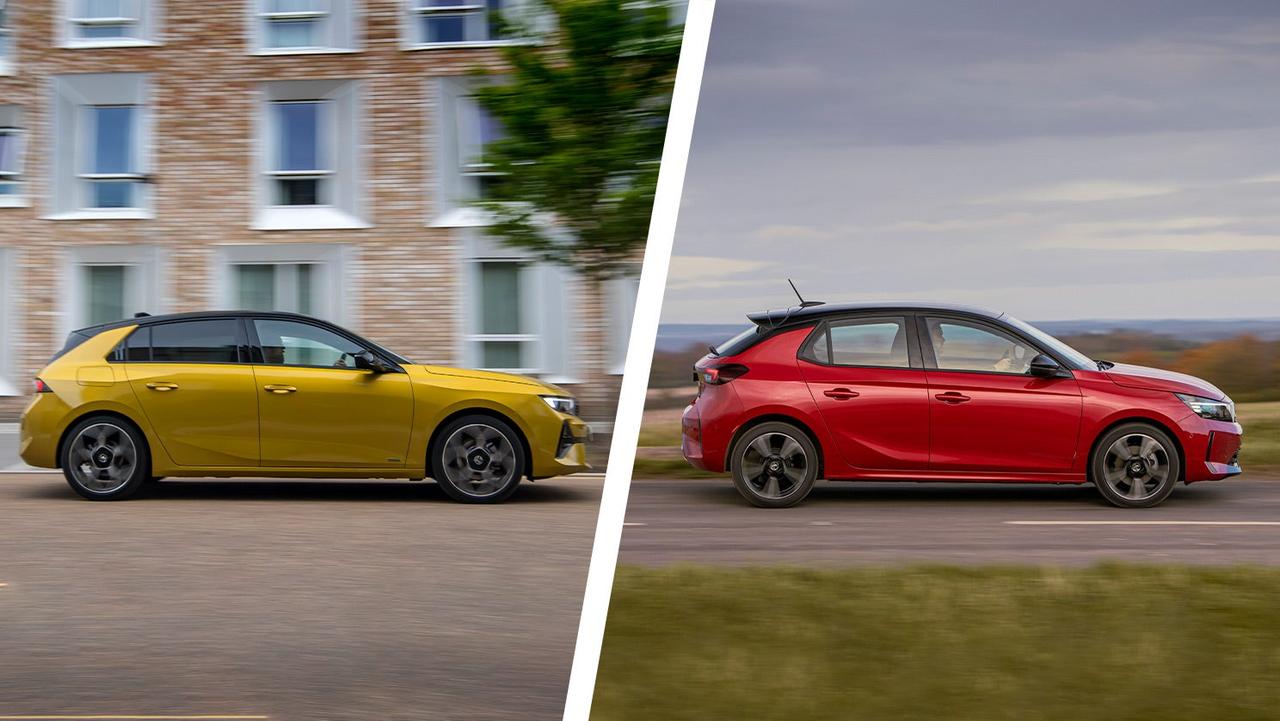
Neither car here is especially exciting to drive. Both suffer from a little too much body roll to have the kind of front-end sharpness that could rival sportier cars like the Mazda 3 or Ford Fiesta. That said, it's unlikely most buyers will really care about the on-track performance of these cars and, instead, focus more on how easy they'll be to weave through urban streets.
In this respect, the Astra is the better-driving car. It's more composed at all speeds and hard impacts from potholes or speedbumps only register as a muted thud, rather than the occasional bang you feel in a Corsa going over craggy road surfaces. The gap between the two cars' on-road experience grows further when you consider the Astra also goes into bat with an acoustically insulated windscreen. This substantially cuts engine and wind noise, as well as the ambient roar of traffic, bestowing the Astra with the kind of refinement you'd normally expect in much pricier cars.
The Corsa might lack the Astra's maturity, but it's not a bad car to drive. Its controls are accurate and predictable, save for a slightly springy clutch pedal, and it feels planted as speeds rise. There's more of a sense of agility through corners thanks to the Corsa's shorter wheelbase, narrower body and lower weight, but it's a shame the safe-feeling handling doesn't make the most of the car's physically smaller size.
Value and reliability
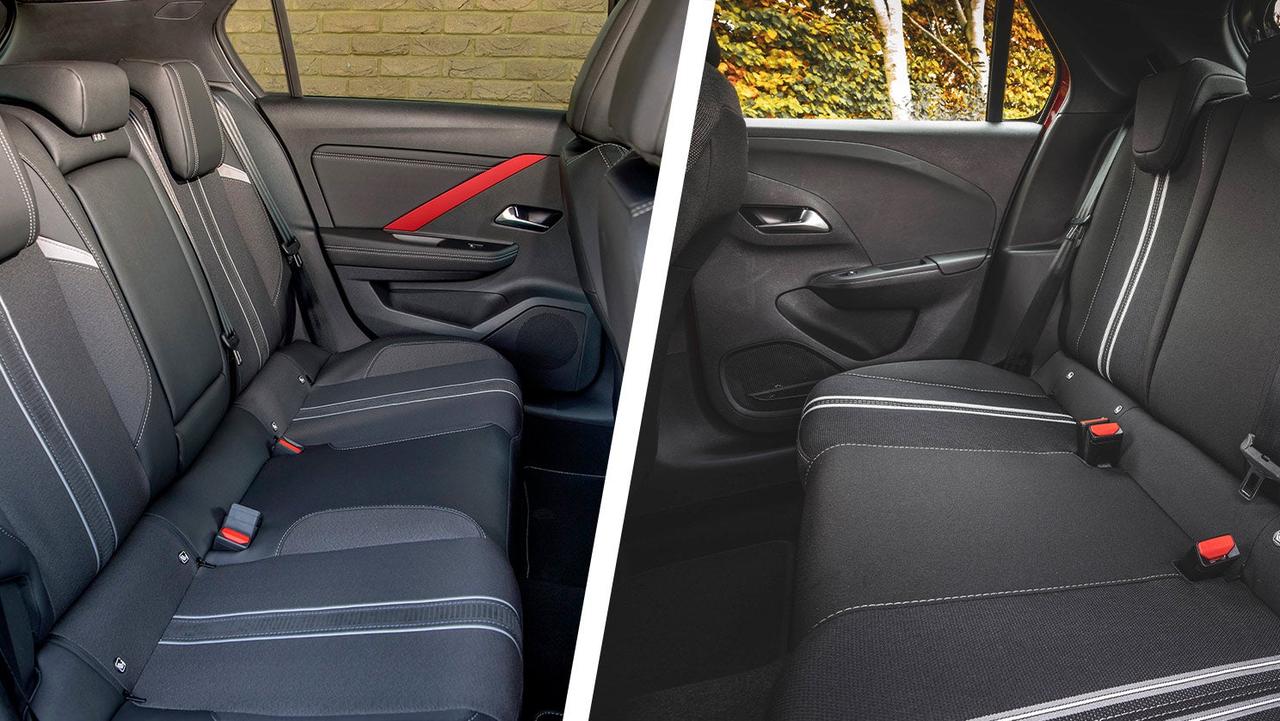
The Astra is a bigger, better equipped and more practical car, with a larger price tag to match. However, when you start looking at prices on the used market, you'll spot the Astra doesn't represent the kind of value for money its predecessors did. Prices very closely match those of the mechanically related Peugeot 308 and even the larger Citroen C5 X, where once the Vauxhall might've undercut these rivals. To be clear, the Astra feels like it's worth the asking price – it's just a shame it no longer obviously outstrips rivals on value.
The Corsa, however, is a more familiar story, with loads of options on the used market and prices that are noticeably cheaper than rivals like the Peugeot 208 and Ford Fiesta. This arguably makes the Corsa not just cheaper but better value for money overall than the Astra, because it's much easier to forgive spots where it slightly underperforms compared to direct competition when you bear in mind how much less the little Vauxhall is to buy in the first place.
As for dependability, Vauxhall returns generally acceptable performance across several reliability surveys. Many of the parts and engines that make up the Astra and Corsa are widely shared across Peugeot, Citroen, DS and other Vauxhall models, so replacements should be easy to track down. Either model can be purchased as a used car with an extended warranty, which protects you from the cost of unexpected mechanical or electrical failures for greater peace of mind.
Which is best?
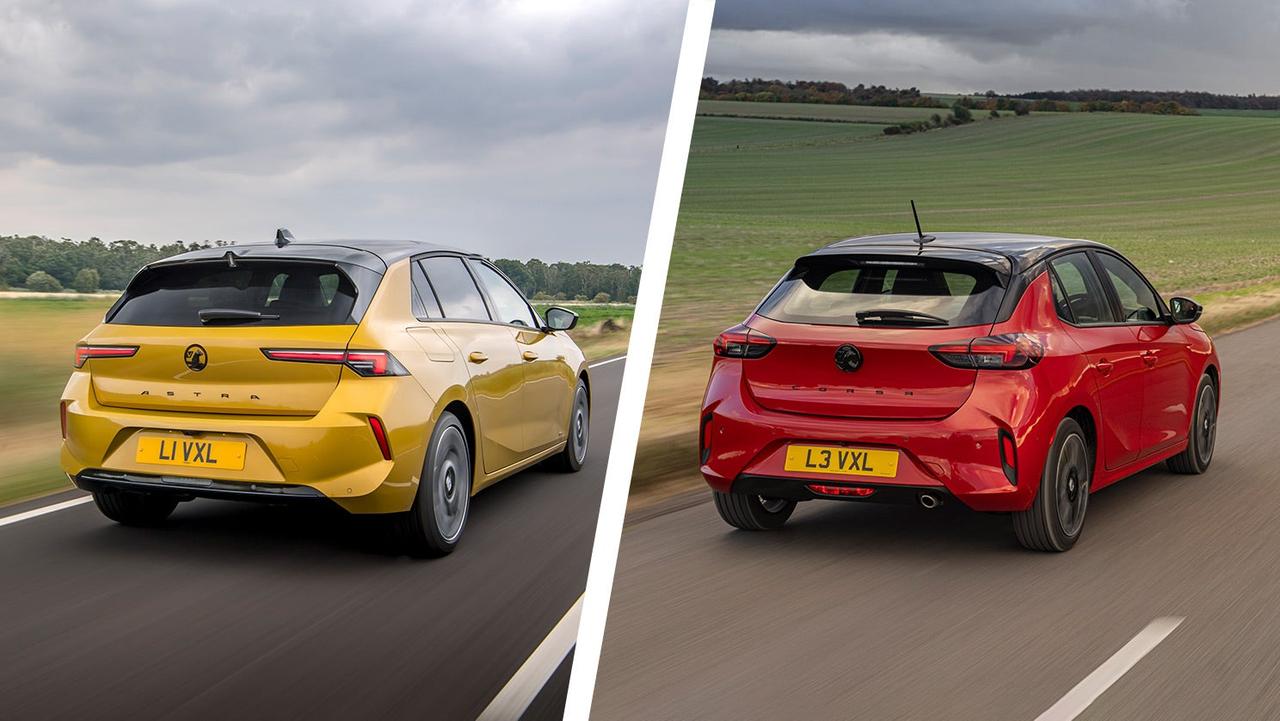
Budget will be the biggest deciding factor here, of course. The Astra is quite a bit more expensive than the Corsa, so you'll need more money upfront or a more accommodating monthly budget to afford one. If you're in the grey area hovering between a high-end Corsa or an affordable Astra, we'd be tempted to stretch the budget to the Astra. Its calmer, more grown-up driving experience, as well as better practicality, make it easier to live with day-to-day, and the cabin feels like a generational improvement over the Corsa.
That said, if your budget won't cover an Astra, the Corsa still delivers most of the same experience at a substantially lower price point. You'll have to put up with its tighter, more plasticky cabin, but you'll probably have a little more fun on a twisty road thanks to the car's physically smaller size. It's also a great option if you're looking for an affordable electric car, with prices for used Corsa Electric models either matching or, in some cases, even undercutting similar petrol-powered versions.
Check out the savings available on used Vauxhall Astra and used Vauxhall Corsa cars from Motorpoint. To see a wider selection of tempting models, view our choices for the best hatchbacks you can buy.


































.jpg&w=744&q=75)
